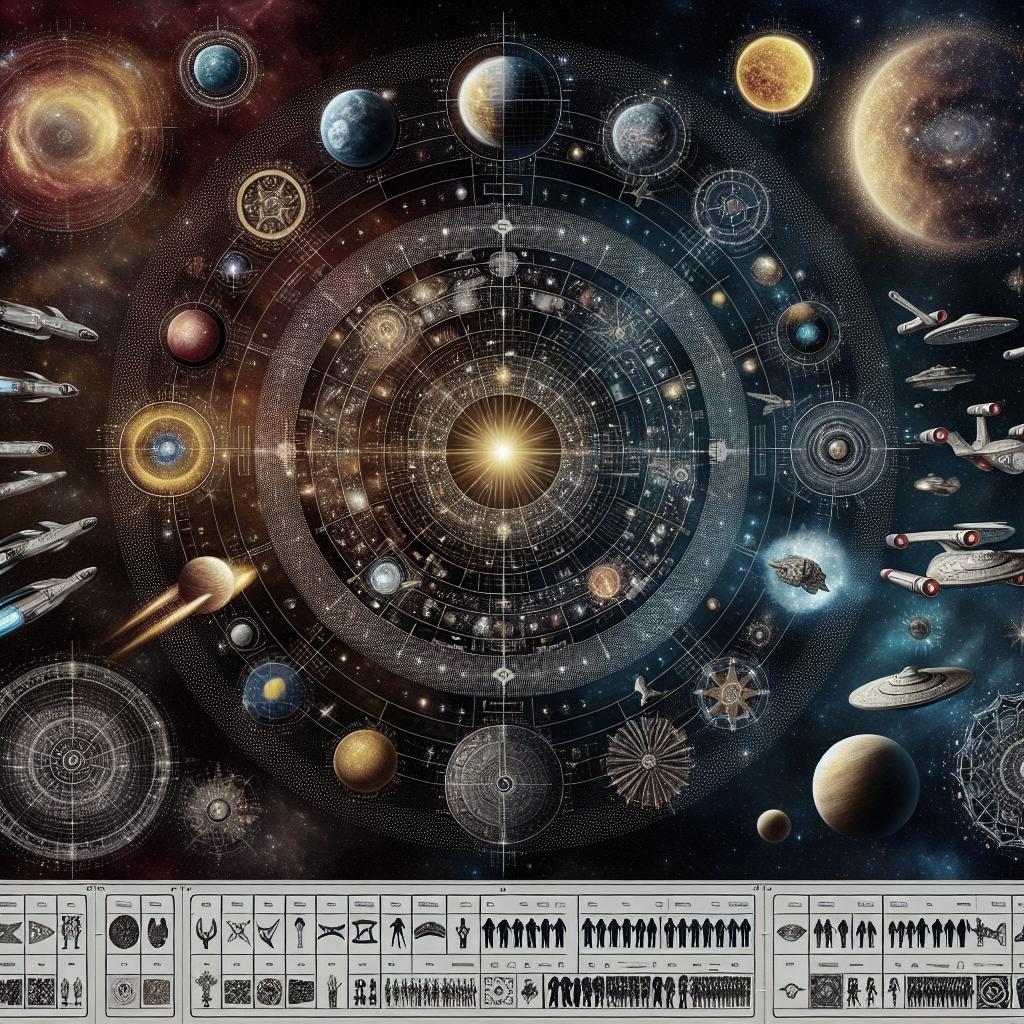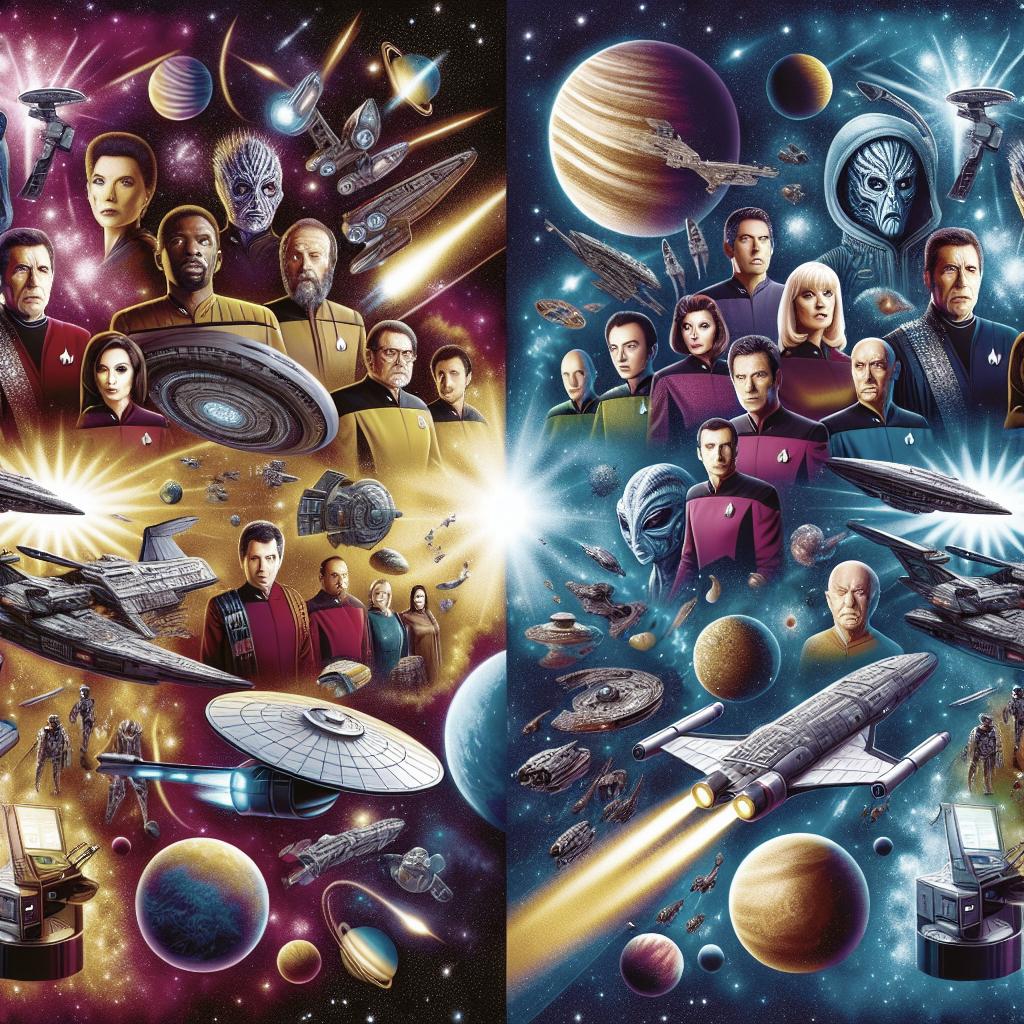“`html
Spanning decades and captivating audiences around the world, the Star Trek franchise offers an eclectic mix of series. Each brings its unique storytelling style, themes, and character dynamics to the screen. From the original series that began it all to the animated adventures and bold recent entries, each iteration carries the legacy of exploration and innovation. This blog post will guide you through a comprehensive comparison of the various Star Trek series, examining what makes each one distinctive. Whether you’re a long-time Trekkie or a newcomer to the Federation’s voyages, this guide seeks to spotlight the series that have defined, reinvented, and expanded the Star Trek universe. Let’s dive into the captivating world of Star Trek and explore the unique contributions each series has made to this storied science fiction epic.
1. Star Trek: Deep Space Nine (1993–1999)
Star Trek: Deep Space Nine (DS9) stands out from other series in the franchise due to its stationary setting on a space station near a strategically vital wormhole. This shift from the exploratory missions of starships brought a new dynamic to the narrative and allowed DS9 to delve deeper into political and cultural conflicts. The series is celebrated for its complex storytelling, which often explored the shades of grey in its characters and conflicts.
The show’s willingness to tackle darker and morally ambiguous themes set it apart. The introduction of the Dominion War arc offered long-term storytelling that was relatively unprecedented in the franchise, weaving a tapestry of narratives that intertwined personal and galactic stakes. This serialized storytelling was complemented by character development that saw figures like Captain Sisko and Major Kira grow in complex and sometimes unexpected ways.
2. Star Trek: The Original Series (1966–1969)
The Original Series (TOS) is where it all began, launching the Star Trek phenomenon with its optimistic vision of the future. Under the command of Captain James T. Kirk, the USS Enterprise set the stage for a series filled with exploratory missions and cultural confrontations. TOS was groundbreaking in its approach to diversity and social commentary, often addressing contemporary issues through the lens of science fiction.
Despite only running for three seasons, TOS developed a devoted fan base and left a lasting cultural impact. Its blend of adventurous storytelling and character-driven plots introduced iconic characters, like Mr. Spock and Dr. McCoy, whose interactions remain fodder for endless fan discussions. The legacy of TOS is continually felt across the franchise, serving as the foundation upon which subsequent series were built.
3. Star Trek: The Next Generation (1987–1994)
Star Trek: The Next Generation (TNG) revived the franchise in the late 1980s with Captain Jean-Luc Picard at the helm of the USS Enterprise-D. This series expanded the Star Trek universe, introducing new species, complex politics, and philosophical quandaries. TNG is particularly noted for its character development and the moral dilemmas faced by the crew, engaging viewers with stories that often challenged perceptions and inspired debate.
The series also pushed the envelope technologically, using advanced special effects to depict visionary concepts. Characters like Data, an android seeking humanity, and Worf, a Klingon navigating his cultural identity, provided unique opportunities to explore identity and ethics. TNG’s success paved the way for the multitude of spin-offs that followed, establishing a blueprint for Star Trek’s enduring appeal.
4. Star Trek: Strange New Worlds (2022–present)
Star Trek: Strange New Worlds returns to the roots of the franchise, focusing on episodic storytelling and exploration. Following Captain Christopher Pike aboard the USS Enterprise, this series promises a return to the serialized format seen in earlier series, while integrating modern storytelling techniques. The show has garnered praise for capturing the essence of what made the original series beloved while updating it for a contemporary audience.
Much of the buzz around Strange New Worlds centers on its commitment to classic adventure and exploration themes. Characters familiar to longtime fans, like Spock and Number One, are given renewed focus, with storylines that blend action, humor, and moral complexity. It’s a series aiming to balance nostalgia with innovation, appealing to both seasoned fans and new viewers.
5. Star Trek: Lower Decks (2020–present)
Star Trek: Lower Decks offers a comedic twist to the franchise, as an animated series focused on the lives of the support crew on the USS Cerritos. Unlike previous series that focused on the bridge crew’s adventures, Lower Decks highlights the mundane yet humorous aspects of life in Starfleet. Its satirical approach offers a refreshing take on the classic Star Trek formula, resonating with audiences for its irreverent yet affectionate homage to the franchise.
The show’s humor often stems from its expansive references to Star Trek canon, creating a meta-commentary that both pokes fun at and celebrates the franchise’s extensive lore. By spotlighting lower-ranking crew members, Lower Decks presents an opportunity to explore the Star Trek universe from a new perspective, shedding light on the often-overlooked aspects of life on a starship.
6. Star Trek: Voyager (1995–2001)
Star Trek: Voyager follows the crew of the USS Voyager as they navigate the Delta Quadrant, far from Federation support. The series is marked by its focus on survival, camaraderie, and exploration in an unknown region of space. Under Captain Kathryn Janeway’s leadership, Voyager introduced new species and focused heavily on character-driven stories.
Voyager’s crew diversity added richness to its narrative, tackling themes of unity and cooperation amidst adversity. The introduction of the Borg character Seven of Nine provided a new perspective on humanity, enhancing the series’ exploration of identity and belonging. Despite being polarizing among fans, Voyager’s storytelling and unique premise secured its place in the Star Trek legacy.
7. Star Trek: Discovery (2017–present)
Star Trek: Discovery reimagined the franchise for the streaming era with serialized storytelling and high production values. Set a decade before the events of TOS, Discovery has explored diverse narratives and introduced significant technological advancements in visual storytelling. The series stars Sonequa Martin-Green as Michael Burnham, adding depth to the Star Trek universe with her character’s personal journey and the series’ rich story arcs.
Discovery’s exploration of themes such as redemption, identity, and diversity resonated with both fans and new audiences. The series has continuously reinvented itself with new settings and evolving narratives, ensuring its relevance in an era of rapid content consumption. Its bold storytelling choices, including the portrayal of diverse and inclusive characters, underscore Star Trek’s timeless principles amid contemporary issues.
8. Star Trek: Prodigy (2021–present)
Star Trek: Prodigy is a unique entry targeted at a younger audience, combining stunning animation with the classic adventure ethos of Star Trek. It follows a group of young aliens who discover an abandoned Starfleet vessel, embarking on a journey of discovery and self-growth. This series marks a departure in style and tone, fostering the next generation of Star Trek fans.
Prodigy explores themes of teamwork, responsibility, and leadership, often incorporating educational elements into its narratives. Its appeal lies in its accessibility and the way it broadens the Star Trek universe for a younger demographic. By introducing children to core Star Trek values of exploration and inclusion, Prodigy continues the franchise’s legacy of inspiring future explorers.
9. Star Trek: Enterprise (2001–2005)
Star Trek: Enterprise served as a prequel to the previous series, delving into the early days of Starfleet and humanity’s initial ventures into deep space. Set in the 22nd century, the series offers insight into the challenges of pioneering space exploration. Captain Jonathan Archer and his crew navigate uncharted territories without the advanced technologies seen in later series.
Enterprise explored foundational Star Trek themes like exploration, friendship, and diplomacy. The series received mixed reactions from fans but was praised for its deep dives into Starfleet’s origins and its attempts to build a bridge between familiar Star Trek lore and new storytelling avenues. Despite its premature cancellation, Enterprise carved a niche for itself by enriching the franchise’s history.
10. Star Trek: The Animated Series (1973–1974)
The Animated Series (TAS) was the first Star Trek series to venture into animation, continuing the adventures of the TOS crew. While it was initially aimed at a younger audience, TAS maintained the core storytelling elements of its predecessor, tackling intriguing science fiction concepts that sometimes exceeded those of the live-action formats.
Despite its short run, TAS left an indelible mark on the Star Trek universe, further exploring the original series’ characters and settings. Notably, it won an Emmy Award, highlighting its creative storytelling and contribution to the franchise’s legacy. TAS’s influence is evident in the way it expanded the narrative possibilities for future Star Trek series, inspiring subsequent animated ventures like Lower Decks.
11. Star Trek: Picard (2020–2023)
Star Trek: Picard revisits the iconic character of Jean-Luc Picard, exploring his life after the events of TNG. This series offers a reflective and sometimes poignant look at the legacy of one of Star Trek’s most beloved captains. Set in a universe both familiar and changed by time, Picard seamlessly balances nostalgia with innovation through its character-driven narrative.
Picard crafts a narrative that intertwines new and old characters, addressing themes of memory, responsibility, and renewal. The series is revered for its mature storytelling and its ability to engage with contemporary issues within the Star Trek framework. With Picard, the franchise continues to offer thought-provoking entertainment that resonates with both long-time fans and newcomers.
Final Thoughts
| Series | Years Aired | Key Themes | Unique Aspects |
|---|---|---|---|
| Deep Space Nine | 1993–1999 | Complexity, Politics | Stationary setting, Dominion War arc |
| The Original Series | 1966–1969 | Exploration, Diversity | Original characters, Cultural impact |
| The Next Generation | 1987–1994 | Morality, Identity | Advanced effects, Expanded universe |
| Strange New Worlds | 2022–present | Exploration, Adventure | Return to episodic format, Nostalgia |
| Lower Decks | 2020–present | Humor, Canon Commentary | Animated comedy, Focus on support crew |
| Voyager | 1995–2001 | Survival, Diversity | Delta Quadrant setting, Borg integration |
| Discovery | 2017–present | Diversity, Redemption | Streaming era innovations, Character depth |
| Prodigy | 2021–present | Education, Teamwork | Focused at young audience, Animated |
| Enterprise | 2001–2005 | Origins, Exploration | Prequel setting, Early Starfleet days |
| The Animated Series | 1973–1974 | Family-friendly, Adventure | Animated continuation, Emmy winner |
| Picard | 2020–2023 | Legacy, Introspection | Revisited characters, Mature narrative |
“`


